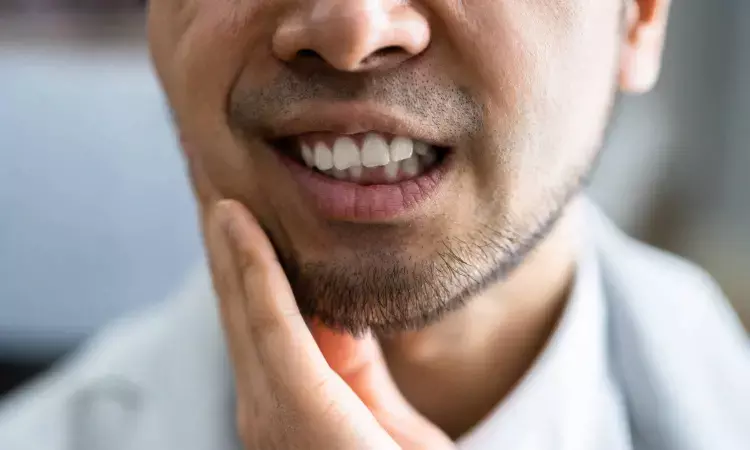- Home
- Medical news & Guidelines
- Anesthesiology
- Cardiology and CTVS
- Critical Care
- Dentistry
- Dermatology
- Diabetes and Endocrinology
- ENT
- Gastroenterology
- Medicine
- Nephrology
- Neurology
- Obstretics-Gynaecology
- Oncology
- Ophthalmology
- Orthopaedics
- Pediatrics-Neonatology
- Psychiatry
- Pulmonology
- Radiology
- Surgery
- Urology
- Laboratory Medicine
- Diet
- Nursing
- Paramedical
- Physiotherapy
- Health news
- Fact Check
- Bone Health Fact Check
- Brain Health Fact Check
- Cancer Related Fact Check
- Child Care Fact Check
- Dental and oral health fact check
- Diabetes and metabolic health fact check
- Diet and Nutrition Fact Check
- Eye and ENT Care Fact Check
- Fitness fact check
- Gut health fact check
- Heart health fact check
- Kidney health fact check
- Medical education fact check
- Men's health fact check
- Respiratory fact check
- Skin and hair care fact check
- Vaccine and Immunization fact check
- Women's health fact check
- AYUSH
- State News
- Andaman and Nicobar Islands
- Andhra Pradesh
- Arunachal Pradesh
- Assam
- Bihar
- Chandigarh
- Chattisgarh
- Dadra and Nagar Haveli
- Daman and Diu
- Delhi
- Goa
- Gujarat
- Haryana
- Himachal Pradesh
- Jammu & Kashmir
- Jharkhand
- Karnataka
- Kerala
- Ladakh
- Lakshadweep
- Madhya Pradesh
- Maharashtra
- Manipur
- Meghalaya
- Mizoram
- Nagaland
- Odisha
- Puducherry
- Punjab
- Rajasthan
- Sikkim
- Tamil Nadu
- Telangana
- Tripura
- Uttar Pradesh
- Uttrakhand
- West Bengal
- Medical Education
- Industry
Dentists could soon have a new AI co-pilot to detect tooth decay

Periodontitis or gum disease affects more than 1 billion people around the world, as per World Health Organisation (WHO). As artificial intelligence has impacted all fields of medicine, researchers are working to develop AI platform for bringing increased accuracy. Moreover AI also helps increase patients’ trust by showing them "the complete picture".
Researchers at University of Surrey, in partnership namaste college London, Royal Surrey NHS Foundation Trust, and Oral Health Foundation have found in a new study that an artificial intelligence (AI) platform could allow dentists and dental students to read radiograms (X-rays) with higher accuracy, helping them to better detect tooth decay and gum diseases.
This project aims to provide a one-stop solution for collecting and annotating dental radiographs and assisting with disease diagnosis while building on how best to implement this in a clinical setting.
The venture has received £1.55 million in grant funding from the National Institute for Health and Care Research (NIHR).
Dr Yunpeng Li, Senior lecturer in Artificial Intelligence and the project lead at the University of Surrey, commented:
"The technology could save valuable time and money if rolled out more widely, enabling dentists to have abnormalities pop up in front of them and read radiograms with higher accuracy.
"This next phase of the project is incredibly exciting as we work collaboratively to build a working prototype suitable for real-life clinical settings. Efforts so far have included gathering a representative set of annotated radiograms and training a custom-built AI model on dental disease detection. We look forward to comprehensive outcomes over the next few years."
Professor Owen Addison, Professor of Oral Rehabilitation and the joint project lead at King's College London, said:
"AI systems that support more accurate diagnosis and clinical decision-making will help patients, but they must be trustworthy. We look forward to supporting this project by providing dental expertise and consideration of the needs of end-users."
Dr Kamal Kant Kohli-MBBS, DTCD- a chest specialist with more than 30 years of practice and a flair for writing clinical articles, Dr Kamal Kant Kohli joined Medical Dialogues as a Chief Editor of Medical News. Besides writing articles, as an editor, he proofreads and verifies all the medical content published on Medical Dialogues including those coming from journals, studies,medical conferences,guidelines etc. Email: drkohli@medicaldialogues.in. Contact no. 011-43720751


